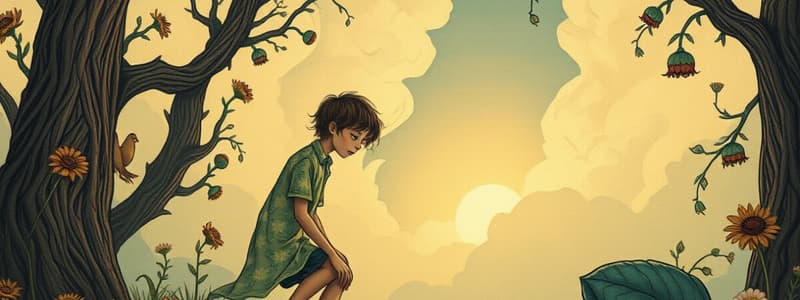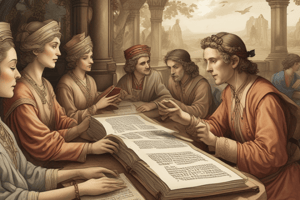Podcast
Questions and Answers
What is Roger's character like?
What is Roger's character like?
Roger is an uncommunicative, moody and secretive loner, preferring to use power as a weapon of evil.
What does Roger represent?
What does Roger represent?
Roger represents the sadist, the individual who enjoys hurting others.
How does Roger relate to change?
How does Roger relate to change?
Roger's sociopathic tendencies are allowed to surface on the island, as there are no adult restraints.
Why does Roger appeal to Jack's leadership?
Why does Roger appeal to Jack's leadership?
How does Roger show savagery?
How does Roger show savagery?
What does Roger killing Piggy symbolize?
What does Roger killing Piggy symbolize?
How does Roger change on the island?
How does Roger change on the island?
Explain the quote, 'You don't half look a mess.'
Explain the quote, 'You don't half look a mess.'
Explain the quote, 'You couldn't stop me coming if I wanted.'
Explain the quote, 'You couldn't stop me coming if I wanted.'
Give a quote to describe Jack and Roger's relationship.
Give a quote to describe Jack and Roger's relationship.
Give a quote for Roger's desire for violence.
Give a quote for Roger's desire for violence.
Give a quote to show how Roger interacts with other people on the island.
Give a quote to show how Roger interacts with other people on the island.
Study Notes
Roger's Character
- Roger is portrayed as a solitary, moody figure, using power destructively and reveling in violence.
- He is involved in Simon's death but is notably responsible for Piggy's murder, showcasing his extreme sadism.
Representation of Sadism
- Represents the archetype of a sadist who relishes in inflicting pain, distinguishing him from Jack's motivations tied to leadership and competition.
Change in Nature
- Already possessing sociopathic traits, Roger's behavior becomes more malevolent on the island due to the absence of societal constraints.
- Freed from traditional civilizing forces, he embraces his dark inclinations without the fear of punishment.
Appeal to Jack's Leadership
- Aligns with Jack's authoritarian rule, which liberates him to indulge in violence more freely compared to Ralph's structured society.
- The introduction of hunting amplifies his brutal nature, escalating from animal cruelty to the murder of humans like Piggy and Simon.
Embodiment of Savagery
- Escapes societal norms, committing heinous acts such as torturing others and engaging in brutal killings.
- Engages in violent acts not only to please Jack but also as an outlet for his inherent cruelty.
Significance of Piggy's Murder
- The act of killing Piggy serves as a crucial turning point, signifying the triumph of savagery over civilization, especially with the destruction of the conch representing order.
Escalation of Brutality
- Initially reserved, Roger's sadistic tendencies become evident as he terrorizes smaller boys, setting the stage for his eventual lethal actions.
- The incident where he throws rocks foreshadows his future violence, culminating in Piggy's death.
Quotes Reflecting Savagery
- "You don't half look a mess" illustrates Roger's embrace of savagery as he encourages the group's descent into barbarism through Jack's face paint.
- "You couldn't stop me coming if I wanted" reveals Roger's growing malevolence and excitement towards violence, aligning with his eventual brutal act against Piggy.
Dynamic with Jack
- Roger sees Jack's cruelty as a path to power, highlighting the toxic alliance that promotes violence.
- He contemplates "the possibilities of irresponsible authority" rather than questioning Jack's motives, emphasizing his complicity in their savagery.
Desire for Violence
- Roger engages in "delirious abandonment" during Piggy's death, fully succumbing to his violent impulses.
Interaction with Others
- Described as a "terror" by others, Roger's terrifying presence solidifies his reputation as a monstrous figure thriving under Jack's leadership.
- Lacks empathy, he represents the embodiment of unchecked violence and horror within the group dynamics.
Studying That Suits You
Use AI to generate personalized quizzes and flashcards to suit your learning preferences.
Description
Explore the dark character of Roger in 'Lord of the Flies'. This quiz delves into his sadistic nature, his relationship with Jack's leadership, and how the absence of societal norms transforms his behavior. Understand the psychological underpinnings of his actions throughout the novel.




